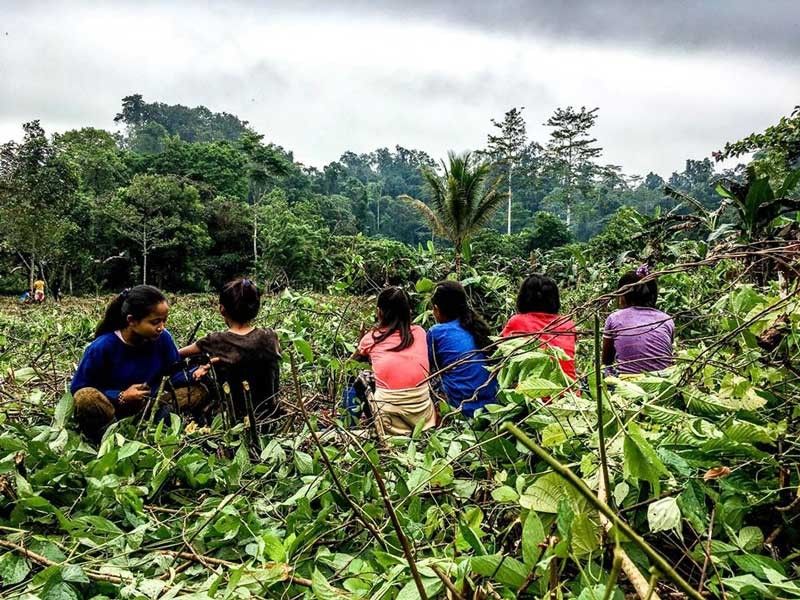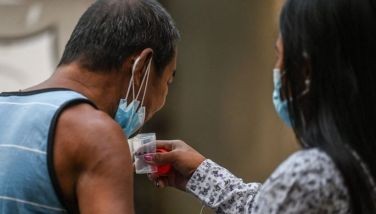IP rights advocates wary of using 'idle' ancestral domain as food production areas

MANILA, Philippines — The Department of Agriculture should look to developing existing farmland instead of turning supposedly idle portions of ancestral domain into food production areas, indigenous peoples' rights advocates said Friday, adding food is already being grown in IP land anyway.
The DA, in a release on Thursday, said it is calling on IP groups "to transform part if not most of their idle ancestral lands into vegetable and high-value crop farms" under the government's "Plant, Plant, Plant" program for urban and community farming.
The department said that it will "allot a substantial budget to bankroll the enhanced food production program in ancestral lands." That support will include providing seeds for high-value crops, vegetables, and fruit trees.
Agriculture Secretary William Dar told reporters Thursday that according to consultations by the National Commission on Indigenous Peoples, IP communities need the program "so they will be food secure and reduce their dependence on the commercial market." He also indicated that the DA has been regularly giving support to IP groups that avail of the assistance.
He said in a DA press release on Thursday that "aside from profitable types of vegetables — like onion, string beans, potato, carrots, pineapple, garlic, cauliflower, and watermelon — our brother IPs can grow cacao, coffee, abaca or black pepper, or they may go into raising native pigs and free-range chicken."
'IP land not idle'
Rep. Eufemia Cullamat (Bayan Muna party-list), a Manobo leader, said Friday however that indigenous land is not idle. "From the start, this has been used productively, cared for and preserved by the IPs because this is our land and our livelihood," she said in Filipino in an email to Philstar.com.
She said a large portion of land recognized as ancestral domain is forest land, which should be conserved.
"We have been planting for centuries. Innovations like rice terraces and upland farming show that unlike big haciendas and corporate plantations, we know how to feed our communities while sustaining the health of our people as well as the environment. You need not tell us to 'plant, plant, plant,' Sandugo, a Moro and IP rights group, said in a separate statement on Friday.
Cullamat and Sandugo are wary that the call to make use of the supposedly idle IP land is similar to a pronouncement by President Rodrigo Duterte in 2018 that he would handle looking for developers for ancestral domain.
RELATED: Lumad group to resist 'intrusion' into ancestral lands
The DA, while Emmanuel Piñol was secretary, also proposed in 2018 "to transform the vast tribal lands into food production areas," saying "several lands are left idle and unproductive because of the failure of government to initiate projects in the area."
Under the law, IPs have the right to decide for themselves how their ancestral domain will be used and developed. Activities like mining, which some Lumad communities oppose, require free and informed prior consent from the IP community.
However, disputes on who should represent the community and give that consent has also led to conflict within IP groups. Dar indicated Thursday
"We defend ancestral land from mining and plantations because we know they are important in achieving food security," Cullamat said. "But the government insists on these (kinds of ) projects. Now they are insisting on this project even while we are in the middle of a pandemic."
Cullamat said the government should instead work on removing factors—like encroachment into IP land—that keep indigenous peoples from "sustainable development of our ancestral domain."
'Develop existing farmland'
Sandugo said that the Philippines already had 7 million hectares of farmland in 2012, "[including] indigenous lands converted throughout history, by force or deception, into large-scale plantations and private farms" that can be used for food production.
"These millions of hectares of plantations produce not food for our citizens, but raw export materials like palm oil, rubber, orchids, and fruits," it claimed.
Sandugo acknowledged, though, that the government should help farmers and work towards food security.
"They cannot feed the nation if they themselves are starving," Sandugo said.
The group said the government should also make the most use of existing farmland "to be more efficient in producing fast-yielding crops that can be used for relief efforts" and make sure that local goverments buy and transport the crops to needy constituents.
That, it said, would "help LGUs provide urgent and nutritious food aid to the most vulnerable, especially the urban poor."
The government should also come up with a food sufficiency program that will include "rural industrialization and genuine land reform."
Cullamat added: "There are vast idle lands on the route to Tagaytay and so much agricultural land is being converted into subdivisions but it's on ancestral domain that they're saying we should 'plant, plant, plant'."
- Latest
- Trending

































